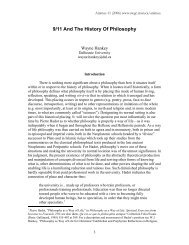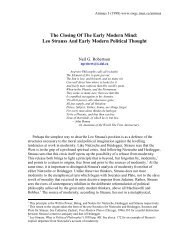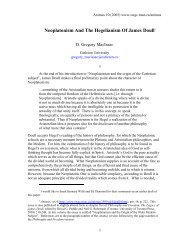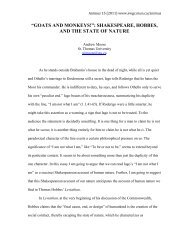Floy E Andrews, On Reading Philosophy after Analytic Philosophy.
Floy E Andrews, On Reading Philosophy after Analytic Philosophy.
Floy E Andrews, On Reading Philosophy after Analytic Philosophy.
You also want an ePaper? Increase the reach of your titles
YUMPU automatically turns print PDFs into web optimized ePapers that Google loves.
ANDREWS: ON READING PHILOSOPHY AFTER ANALYTIC PHILOSOPHY<br />
meaningless, for methodological interests in the hard sciences, or as Wittgenstein <strong>after</strong><br />
writing the Tractatus abandoning it for a life as a village schoolteacher 35 , linguistic<br />
philosophy took up the older texts again to dissect and dissolve with their new techniques<br />
of linguistic analysis. Peter Strawson describes those heady days at Oxford:<br />
...in the face of this refined examination of actual linguistic practice, a lot<br />
of traditional philosophical theorizing began to look extraordinarily crude,<br />
like an assemblage of huge, crude mistakes. And it was, of course,<br />
extremely exhilirating to see these huge and imposing edifices of thought<br />
just crumbling away, or tumbling down, to the tune of this fairly modest<br />
sort of piping. 36<br />
Older philosophy was not ignored, but all was grist for the mill. Subsequently, some of<br />
the Ordinary Language analysts reread those older texts and can be described as<br />
expropriating older philosophy, putting it under the knife to cut and pare, transforming<br />
Spinoza or Kant and whoever else fell into their hands into unrecognizable forms of<br />
themselves. But let us let Strawson speak for himself:<br />
You might say that what I was trying to do there [in The Bounds of Sense]<br />
was to perform the intellectual equivalent of a surgical operation on the<br />
body of a great philosoper's greatest work Of course that involved a risk<br />
that one needn't name. The Critique of Pure Reason is a very complex<br />
work with many interconnected doctrines in it, but there is I think a central<br />
distinction we can draw. There is in the work a body of doctrine about the<br />
necessary structure of experience; and this really means, as I said before, a<br />
body of doctrine about the limits of what we make truly intelligible to<br />
ourselves as a possible structure for out own experience. Now this body of<br />
doctrine, though not acceptable in all respects, is in its general outline and<br />
in many substantial points, I think, correct. But it is surrounded by, and in<br />
Kant's own view it's dependent on, another, second body of doctrine,<br />
probably that by which he's best known. And this is the doctrine that the<br />
nature of things as they really are, or as they are in themselves, is<br />
necessarily completely unknown to us ... Now all this second body of<br />
doctrine I take to be a kind of nonsense, though it has a certain appealingly<br />
dramatic and exciting quality, like most metaphysical nonsense. So I<br />
conceived my task to be that of extracting as it were ... the first body of<br />
doctrine from ... the second body of doctrine ... But Kant of course<br />
conceived of this second body of doctrine as intimately and, indeed,<br />
vitally connected with the first body of doctrine; so these connections had<br />
35 He believed that the problems of philosophy had been solved in the Tractatus. See the Preface, 5. True to<br />
this conviction he turned away from the promise of a prominent position in Cambridge for a life of service<br />
to school children.<br />
36 Magee, 116.<br />
104

















